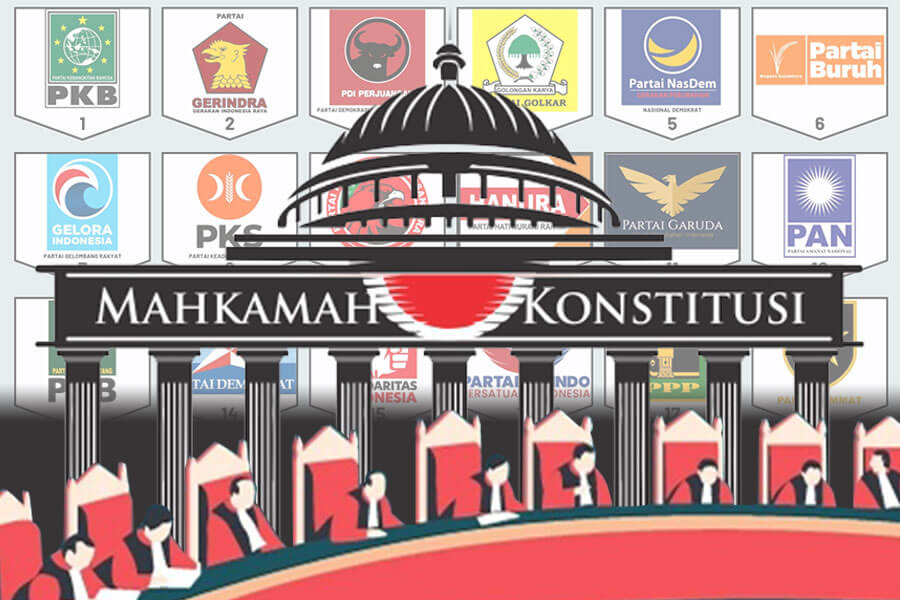Looking Out for of Immoral Constitutions and Antagonistic Elections

The 2024 election has entered the campaign phase. Thus, it is also important to understand that General Elections (Pemilu) in Indonesia are not only becoming a responsibility of the government and political parties, but also involving the active role of the community as voters. Political education that includes a deep understanding of the electoral process, the rights and obligations of citizens, and the impact of antagonistic campaigns can help create intelligent and critical voters.
In this way, transparency mechanisms in the Indonesian government must also be strengthened. An open government will provide the public with better access to information on government policies and decisions. The public can be more actively involved in the process of providing valuable input for improving democracy.
This is because elections filled with negative rhetoric can obscure substantial issues, harm voters and harm the progress of democracy. Thus reducing the level of antagonism in elections requires political commitment to positive campaigns, balanced mass media support, and increased public awareness.
The role of mass media and political education is crucial in shaping public perception and ensuring community participation. And the public can understand the impact of antagonistic campaigns, so they can contribute to a healthier political climate.
So constitutional and electoral reforms that focus on policy debate and constructive solutions can strengthen democracy. Community participation, and demands for transparency, can form the basis of a strong democracy. Society needs to play an active role in supporting democratic values, and ensuring democracy functions for the common good.
So here the challenges of an immoral constitution and antagonistic elections in Indonesia require the attention of all parties, political parties, mass media and society. Through open dialogue, political education, and changes in political culture, Indonesia can build a democracy that is stronger, more inclusive, and responsive to the needs of a diverse society.
Because, an immoral constitution can be a source of instability in the country, therefore it can be prevented. Because the ethical and moral values of society take priority. The consideration is that a lack of integration of moral principles could result in abuse of power, threaten human rights, and harm public trust in government.
The negative impact of an immoral constitution also extends to the legal order, reducing public trust, creating social tension, and hampering the country’s growth. Thus, constitutional reform, which is based on ethical and moral values is needed to rebuild public trust.
Bearing this in mind, it is important to build a constitution that reflects the moral values of Indonesian society, in addition, political and social dynamics continue to develop. So a constitution that combines local wisdom with universal moral principles can provide a stronger legal foundation and be accepted by all elements of society.
Therefore, the constitutional reform process must involve active participation from various community groups. Include representatives from indigenous peoples, religions, and minority groups, to ensure representativeness and acceptability.
In this way, elections in Indonesia have become an important event for expressing the will of the people. At the same time, it should be noted that elections characterized by negative rhetoric and campaigns that lack substance can be detrimental to the democratic process. Therefore, the public needs to be encouraged to appreciate the importance of policy debate and implementing constructive solutions, so that in determining their political choices they become relevant.
Active community participation in the political process is not only limited to elections, but also includes involvement in policy making and government oversight. Communities need to be empowered to have a more proactive role in voicing their aspirations, both through existing participatory mechanisms and through direct dialogue with their representatives at the local and national levels.
Political education is the key in forming a critical and participatory society. Political education programs that are integrated into the school curriculum and public information programs can help increase political literacy and awareness of the importance of a deep understanding of relevant political issues. In this way, society can participate more effectively in the democratic process.
In the context of Indonesia which is rich in cultural plurality, protection and respect for citizens’ rights, including freedom of expression and organization, must be carefully maintained. The government and society together need to work to create an inclusive political climate, where every voice is heard and respected without discrimination.
By viewing this challenge as a collective call, Indonesia can move towards a more mature and sustainable democracy. Collaborative efforts between the government, political parties, mass media and society can form a more solid foundation for a political system that is responsive, fair and better answers society’s needs.
The development of democracy in Indonesia must also always accommodate the rapid dynamics of information technology. The use of social media as a channel for public political communication shows the need for intelligent regulation to prevent the spread of false information and rhetoric statements that are divisive to the society.
Therefore, there needs to be concrete steps in involving the authorities, social media platforms and the public to ensure transparency and accuracy of information during the election period. The importance of building the capacity of election supervisory institutions, such as the General Election Commission (KPU) and the Election Supervisory Body (Bawaslu) – cannot be ignored. Improving the quality and independence of these institutions will provide confidence to the public regarding the integrity and fairness of elections. The public needs to be encouraged to be more active in monitoring and reporting election violations, so that quick and effective action can be taken.
(Prof. DR. Drs. Ermaya Suradinata, SH, MH, MSI, is the former Director General of Sospol of the Ministry of Home Affairs RI, Rector of IPDN, Governor of Lemhannas RI, and currently the Board of Experts for Geopolitics and Geostrategy of BPIP RI.)
